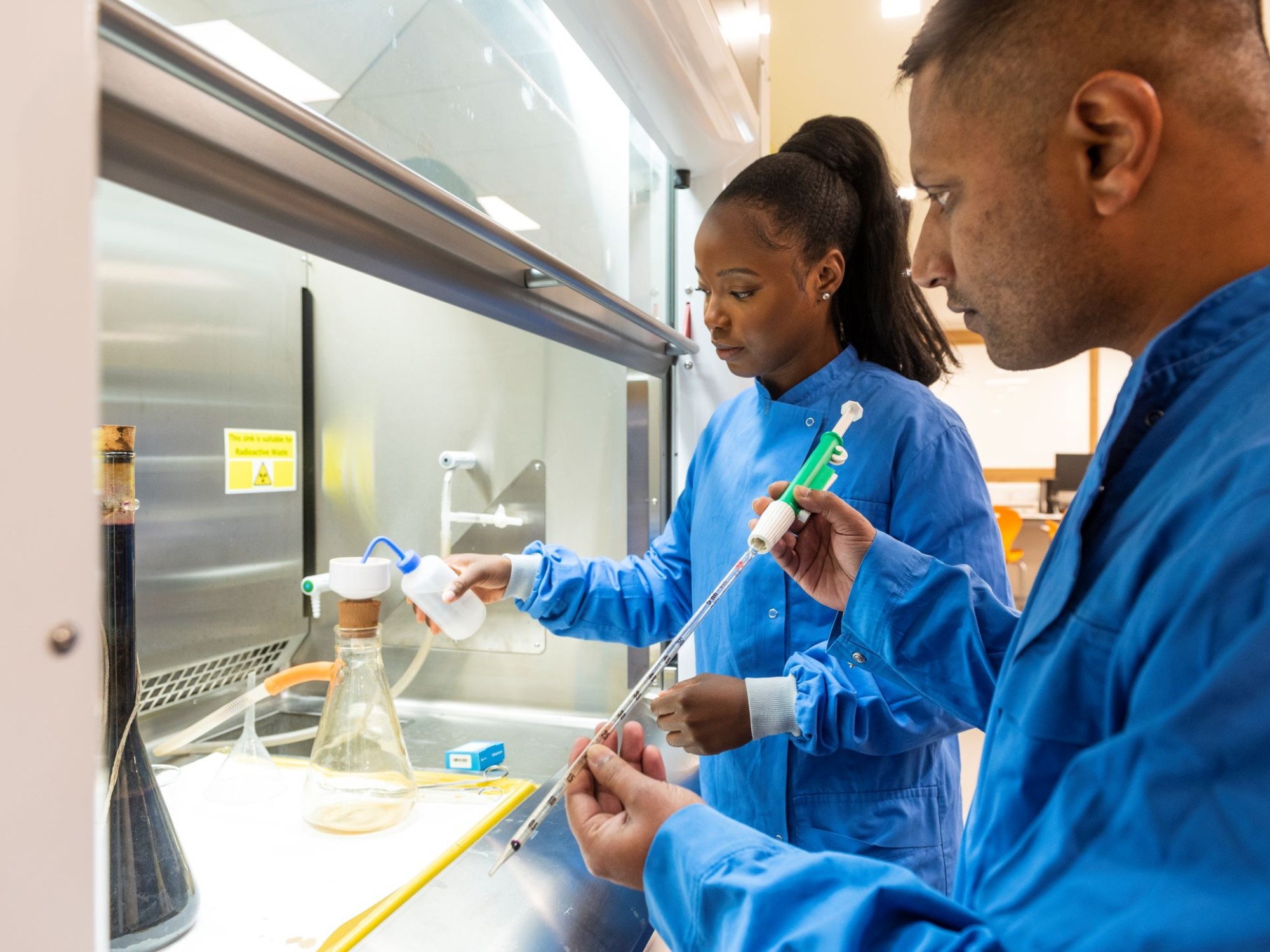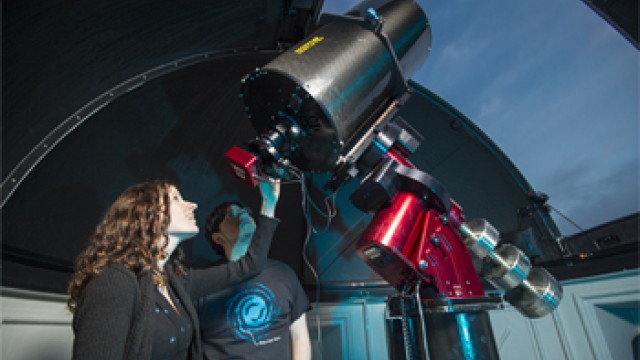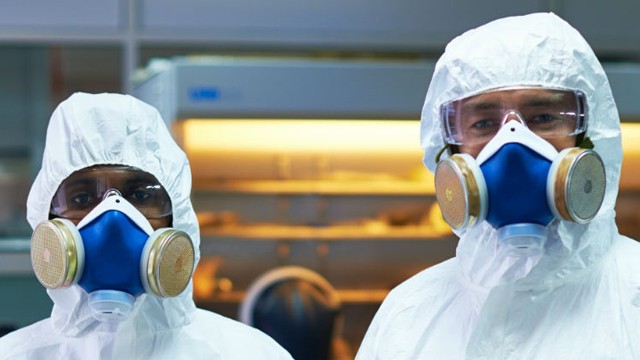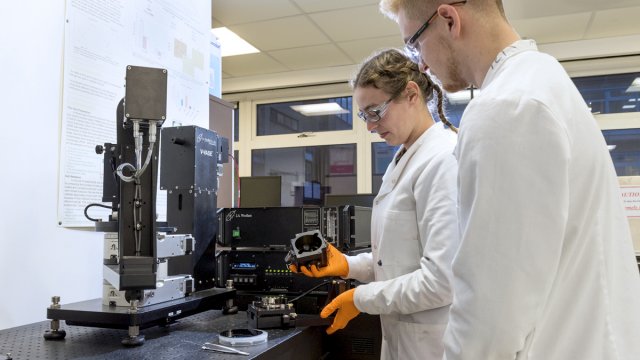
- Physics
PhD Physics
Our PhD programmes within the School of Mathematics and Physics provide opportunities for experimental, theoretical and computational research in both fundamental and applied physics, in subjects such as nuclear and radiation physics, astrophysics, photonics, soft matter, quantum technologies and medical physics.
4,138+ people have created a bespoke digital prospectus
Why choose this
programme?
The School of Mathematics and Physics is home to PhD students from around the world, supported by 54 full-time, research-active academic staff.
You’ll have the opportunity to collaborate with scientists around the world and take advantage of our strategic partnerships with organisations such as the National Physical Laboratory and the Royal Surrey County Hospital. We’re part of the South East Physics Network, which is made up of nine leading universities working to deliver excellence in physics (SEPnet). You’ll become part of SEPnet’s graduate network (GRADnet), the largest postgraduate research school in England.
We have an excellent graduate employability record, with 100% of our physics research students going on to employment or further study (Graduate Outcomes 2025, HESA) and the collaborative, interdisciplinary and industry-relevant nature of our research means you’ll make contacts, gain skills and get practical experience that gives you an edge with employers.
Our research ranges from fundamental topics in nuclear theory and astrophysics, to applied research in semiconductor devices and medical physics. Our nuclear physics group is the largest combined experimental and theoretical group in its field in the UK. Our research in astrophysics is dynamic and rapidly growing, and our latest research in quantum technology has resulted in articles published in top international journals. Our research often has strong practical applications, such as the strained layer laser that is today ubiquitous in information technology.
Statistics
100%
Of our physics research graduates are in employment or further study within 15 months of graduating (Graduate Outcomes 2025, HESA)
Top 15 for research power
The University of Surrey ranks 15th in the UK for research power for engineering (REF 2021)
Top 20 for research outputs
The University of Surrey ranks top 20 in the UK for the overall quality of our research outputs (REF 2021)
Studentships
Building synthetic self-propelled cells for bioinspired motion
UKRI standard stipend - £20,780 for 2025/26 academic year.
China Scholarship Council - Surrey Awards
Successful candidates will each receive a full tuition and bench fee waiver (if any applicable).CSC will provide each scholarship recipient with a living stipend (incl. medical insurance) as prescribed from time to time by the Chinese Government. CSC will also cover an international roundtrip airfare of economy class between China and the United Kingdom and will provide a one-off visa application fee reimbursement.
What you will study
It normally takes between three and four years of full-time study to complete our PhD in Physics.
You’ll be assigned two supervisors, both based at the University of Surrey. Your principal supervisor will be an expert in your area of research and will guide you through your PhD. Together, your supervisors will help you define the objectives and scope of your research, and help you learn the experimental, theoretical and computing skills that you need to complete your research.
As a doctoral student in the School of Mathematics and Physics, you’ll be assigned to a research group with a team of academics, postdoctoral researchers, guest scientists and fellows. Each group has its own seminar programme, giving you the opportunity to learn from colleagues and from guest scientists.
You’ll have regular opportunities to meet other PhD students, academics and staff at our informal postgraduate research forum meetings, and to get involved in organising social or other events.
In addition to the award of a PhD, as a doctoral student you’ll be able to join the Institute of Physics as an Associate Member, and you’ll be entitled to apply for full membership after three years of postgraduate study.
Assessment
Your final assessment will be based on the presentation of your research in a written thesis, which will be discussed in a viva examination with at least two examiners.
You have the option of preparing your thesis as a monograph (one large volume in chapter form) or in publication format (including chapters written for publication), subject to the approval of your supervisors.
You’ll complete a confirmation report after 12 months which is assessed by independent examiners.
Location
This course is based at Stag Hill campus. Stag Hill is the University's main campus and where the majority of our courses are taught.
Research themes
Astrophysics
- Multi-scale numerical simulations
- Stellar clusters
- Galaxy formation
- Supermassive black holes
- The hunt for dark matter
- Nuclear and radiation physics.
Experimental nuclear physics
- Physics of exotic nuclei studied with gamma ray spectroscopy, charged particle spectroscopy and radioactive beams.
Theoretical nuclear physics
- Ab initio nuclear structure
- Reactions for stellar nucleosynthesis
- Few body methods for nuclear structure and reactions
- Nuclear matter and neutron stars
- Superheavy nuclei and the creation of new elements
- Resonances and vibrational modes of nuclei.
Radiation detectors
- Fundamental detector physics
- New materials and technologies for detectors
- Novel algorithms and data handling for radiation detectors.
Medical physics
- Trace elements in the body
- Realistic phantoms for medical imaging
- Applications of X-ray tomography
- Radiation transport
- Radiobiology (biological effectiveness and modelling)
- Dosimetry and micro-dosimetry
- Advanced radiotherapy.
Environmental radioactivity
- Gamma ray spectroscopy
- Distribution of radioactivity due to natural and man-made processes
- Optimised sensor placement for radiological research
- Detection of radioactive concealed structures.
Photonics and quantum sciences
- Unconventional semiconductors and nanostructures for new types of lasers and detectors
- Quantum technology based on silicon
- Femtosecond dynamics of electron spins
- Exciton photo-physics in nanostructures
- Quasi-random photonic crystals
- Control of qubits in circuit quantum electrodynamics.
Soft matter
- Integration of nanoscale materials into functional devices
- Non-equilibrium processes in polymer colloids
- Soft polymers and nanocomposites in adhesives
- Computational soft matter, water dynamics in porous media and biological physics
- Fluid dynamics and porous media: magnetic resonance imaging and computational simulation
- Living microbes in hybrid functional materials
- Responsive emulsions and microcapsules
- Adhesives from natural, renewable sources.
Quantum biology
- How quantum coherence is maintained in biological energy harvesting
- The impact of biological noise in quantum coherence.
Research centres and groups
Dr Alessia Gualandris is your Physics PhD supervisor. See a full list of all our academic staff within the School of Mathematics and Physics.
Research support
The professional development of postgraduate researchers is supported by the Doctoral College, which provides training in essential skills through its Researcher Development Programme of workshops, mentoring and coaching. A dedicated postgraduate careers and employability team will help you prepare for a successful career after the completion of your PhD.
Facilities
PhD students in Surrey’s School of Mathematics and Physics enjoy a stimulating research environment with access to state-of-the-art facilities supported by dedicated teams of technical and IT support staff. Some of the larger facilities are mentioned below, with further details available on the web pages of individual research groups.
Research in condensed matter and semiconductor physics is supported by specialist facilities for low temperatures, high magnetic fields and high pressures, in addition to extensive resources for electrical and optical characterisation. An ultrafast (femtosecond) laser laboratory has been augmented with sources of terahertz radiation in collaboration with the National Physical Laboratory. The Soft Matter laboratories comprise a comprehensive suite of facilities for microstructural and complete optical/electrical/thermal characterisation of novel materials from atomic force microscopes to ellipsometry. Nuclear magnetic resonance facilities allow study of water transport in important structural materials.
The interdisciplinary Advanced Technology Institute provides access to facilities related to nanotechnology, including chemical synthesis laboratories, class 100 Clean Rooms for fabrication of electronic and photonic devices, electron microscopy and focused ion beams, and extensive ion beam analysis through Surrey’s Ion Beam Centre.
Students also make use of leading international experimental facilities ranging from free-electron lasers for quantum technology research to a wide range of facilities for nuclear experimental physics. Theoretical research in all areas of physics is supported through high-performance computational clusters.
As much of our postgraduate research is collaborative, you will often be required to travel for meetings with other researchers and to access specialised facilities.
Medical physics research will benefit from access to clinical radiation facilities available at the Royal Surrey County Hospital and the National Physical Laboratory.
UK qualifications
Applicants are expected to hold a first or upper second-class (2:1) UK degree in a relevant discipline (or equivalent overseas qualification), or a lower-second (2:2) UK degree plus a good UK masters degree - distinction normally required (or equivalent overseas qualification).
English language requirements
IELTS Academic: 6.5 or above (or equivalent) with 6.0 in each individual category.
These are the English language qualifications and levels that we can accept.
If you do not currently meet the level required for your programme, we offer intensive pre-sessional English language courses, designed to take you to the level of English ability and skill required for your studies here.
Selection process
Selection is based on applicants:
- Meeting the expected entry requirements and providing all relevant documents including a satisfactory research proposal
- Being shortlisted through the application screening process
- Completing a successful interview
- Providing suitable references.
Fees per year
Explore UKCISA's website for more information if you are unsure whether you are a UK or overseas student. View the list of fees for all postgraduate research courses.
* Please note: any start date other than September will attract a pro-rata fee for that year of entry (75 per cent for January, 50 per cent for April and 25 per cent for July).
April 2026 - Full-time
- UK
- £5,006
- Overseas
- £27,200
April 2026 - Part-time
- UK
- £2,503
- Overseas
- £13,600
July 2026 - Full-time
- UK
- £5,006
- Overseas
- £27,200
July 2026 - Part-time
- UK
- £2,503
- Overseas
- £13,600
October 2026 - Full-time
- UK
- To be confirmed
- Overseas
- £28,300
October 2026 - Part-time
- UK
- To be confirmed
- Overseas
- £14,200
January 2027 - Full-time
- UK
- To be confirmed
- Overseas
- £28,300
January 2027 - Part-time
- UK
- To be confirmed
- Overseas
- £14,200
- Annual fees will increase by 4% for each year of study, rounded up to the nearest £100 (subject to legal requirements).
Additional costs
There are additional costs that you can expect to incur when studying at Surrey.
Funding
Funding for PhD studentships in physics is available through the School from a number of sources:
- STFC Doctoral Training Grant: fully-funded studentships are available for students wishing to study nuclear physics or astronomy. These are funded from the UKRI Science and Technology Research Council.
- Departmental and Doctoral College studentships: fully-funded studentships are available for all physics discipline areas, funded through the University’s internal studentship allocation.
- Co-funding with our research partners: the School has close connections with a wide range of research partners, who may also offer studentship funding. These include the National Physical Laboratory, AWE and other major research organisations.
For an informal discussion about PhD funding options and studentships, please contact the School in the first instance at mathsandphysics-office@surrey.ac.uk.
A Postgraduate Doctoral Loan can help with course fees and living costs while you study a postgraduate doctoral course.
Studentships
Browse our frequently updated list of funded studentships open for applications.
Building synthetic self-propelled cells for bioinspired motion
UKRI standard stipend - £20,780 for 2025/26 academic year.
China Scholarship Council - Surrey Awards
Successful candidates will each receive a full tuition and bench fee waiver (if any applicable).CSC will provide each scholarship recipient with a living stipend (incl. medical insurance) as prescribed from time to time by the Chinese Government. CSC will also cover an international roundtrip airfare of economy class between China and the United Kingdom and will provide a one-off visa application fee reimbursement.
Application process
Applicants are advised to contact potential supervisors before submitting an application via the website. Please refer to section two of our application guidance.
After registration
Students are initially registered for a PhD with probationary status and, subject to satisfactory progress, subsequently confirmed as having PhD status.
Apply online
To apply online first select the course you'd like to apply for then log in.
Select your course
Choose the course option you wish to apply for.
Sign in
Create an account and sign into our application portal.
The closing date is the last day this month is available for applications, but if you are applying through a studentship you must follow the deadline on the advert to be eligible.
ApplyThe closing date is the last day this month is available for applications, but if you are applying through a studentship you must follow the deadline on the advert to be eligible.
ApplyThe closing date is the last day this month is available for applications, but if you are applying through a studentship you must follow the deadline on the advert to be eligible.
ApplyThe closing date is the last day this month is available for applications, but if you are applying through a studentship you must follow the deadline on the advert to be eligible.
ApplyThe closing date is the last day this month is available for applications, but if you are applying through a studentship you must follow the deadline on the advert to be eligible.
ApplyThe closing date is the last day this month is available for applications, but if you are applying through a studentship you must follow the deadline on the advert to be eligible.
ApplyThe closing date is the last day this month is available for applications, but if you are applying through a studentship you must follow the deadline on the advert to be eligible.
ApplyThe closing date is the last day this month is available for applications, but if you are applying through a studentship you must follow the deadline on the advert to be eligible.
ApplyAbout the University of Surrey
Need more information?
Contact our Admissions team or talk to a current University of Surrey student online.
Code of practice for research degrees
Surrey’s postgraduate research code of practice sets out the University's policy and procedural framework relating to research degrees. The code defines a set of standard procedures and specific responsibilities covering the academic supervision, administration and assessment of research degrees for all faculties within the University.
Download the code of practice for postgraduate research admissions (PDF).
Terms and conditions
When you accept an offer to study at the University of Surrey, you are agreeing to follow our policies and procedures, student regulations, and terms and conditions.
We provide these terms and conditions at the offer stage and are shown again at registration. You will be asked to accept these terms and conditions when you accept the offer made to you.
View our generic registration terms and conditions (PDF) for the 2025/26 academic year, as a guide on what to expect.
Disclaimer
This online prospectus has been published in advance of the academic year to which it applies.
Whilst we have done everything possible to ensure this information is accurate, some changes may happen between publishing and the start of the course.
It is important to check this website for any updates before you apply for a course with us. Read our full disclaimer.











